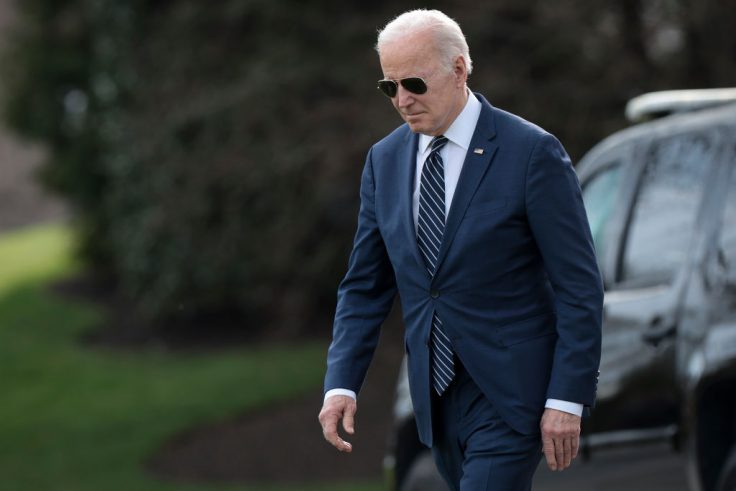
No wonder they give him a list of reporters to call on. President Biden was doing fine at his NATO press conference until it was time to leave. Dazzled by the many reporters barking at him as he moved toward the exit, the president took one more question. He called on Christina Ruffini from CBS News. And instantly regretted it. Their exchange was a reminder that Biden has trouble articulating the meaning of deterrence, the function of alliances, and America’s desired end-state in Ukraine.
“Sir,” Ruffini said, “deterrence didn’t work. What makes you think Vladimir Putin will alter course based on the action you’ve taken today?”
“Let’s get something straight,” Biden replied. “You remember, if you’ve covered me from the very beginning, I did not say that in fact the sanctions would deter him. Sanctions never deter. You keep talking about that. Sanctions never deter.”
They don’t? Then why did Biden threaten Putin with sanctions to begin with?
Anyone with an internet connection and a little curiosity can see that, in the runup to Putin’s invasion, Biden’s vice president, secretary of state, and national security adviser all said the chance of sanctions would have a deterrent effect. Obviously, it did not.
Rather than admit that Ruffini’s premise is correct—U.S. strategy during the end of 2021 and beginning of 2022 did not prevent war—Biden wants to amend the record to grant himself foresight retroactively. Give him points for gall.
What makes sanctions count, Biden said, is how long they are in place. “The maintenance of sanctions, the maintenance of sanctions, the increasing the pain and the demonstration why I asked for this NATO meeting today,” the president continued, “is to be sure that after a month we will sustain what we’re doing, not just next month, the following month, but for the remainder of this entire year. That’s what will stop him.”
Let’s hope so. The record, however, suggests that Biden is wrong. The United States has maintained an embargo on Cuba for six decades. Its behavior hasn’t changed. We’ve sanctioned North Korea for even longer. This week it launched an ICBM. We’ve slapped economic penalties on Iranian malign behavior for 40 years. Penalties that the Biden administration now wants to relax.
Imposed massively and preemptively, sanctions might deter a bad actor. Otherwise, they are punitive. Depending on their severity, they may crash an economy. They may constrain an autocrat. They rarely stop him.
Why? Because money matters less to tyrants than power. Putin desires most the recapitulation of the Russian Empire under his rule. What he fears is the collapse of his regime.
Putin’s been around. He saw the trial and execution of Saddam Hussein. He witnessed the popular removal of autocrats in Tunisia, Yemen, and Egypt during the short-lived Arab Spring. He watched as a mob killed Muammar Qaddafi. Putin has no regard for his citizens’ well-being. He is concerned only with his own.
You deter an adversary by putting at risk something he values. His life, for example. For Putin, the difference between victory and defeat in Ukraine is the difference between power and powerlessness, between life and death.
If President Biden had been more ambiguous about his possible military responses to a Russian invasion, Putin may have thought twice before embarking on his “special military operation.” He might not have wanted to risk a confrontation with the United States that could end in military defeat and political catastrophe. But Biden went out of his way to say that American troops would not protect Ukraine. And Biden has continued to say that his main goal is avoiding “World War III.”
Such caution is worthwhile. After all, prudence is a virtue. But Biden has spent far more time talking about what he won’t do than what he might do if Putin escalates or expands this war. That tendency has given the Russian dictator a strategic advantage.
Putin lost the information war in the West. He failed to achieve his initial objectives of smashing Kiev, overthrowing Zelensky, and splitting NATO. He ruined the Russian economy. But he still has Western governments living in fear of his next move. Fear that acts as a deterrent—on the West.
To quell such fear, Biden will have to rally the alliance to help Ukraine change the facts on the ground from stalemate to counteroffensive. That requires a massive influx of resources to Ukraine, far more economic and military assistance than has been provided already. It requires jettisoning the idea that providing Ukraine with Soviet-era weapons systems, including fighters, or conducting humanitarian airlifts into besieged Ukrainian cities is escalatory. It requires not red lines but strategic ambiguity to keep Putin wondering what the alliance might do next.
Biden isn’t prepared to embark on this course. “We have to stay fully, totally, thoroughly united,” he said at his press conference. Unity is nice. NATO and EU coordination during the crisis has been extraordinary. But these alliances are not ends in themselves. They are means to an end.
President Biden has yet to say what, exactly, that end is. Does the West seek a ceasefire, a Ukrainian victory, an end to Putin’s reign? We’ve said we want the invasion to stop. Of course. But stop where? Stop how?
“The single most important thing is for us to stay unified, and the world continue to focus on what a brute this guy is and all the innocent people’s lives that are being lost and ruined, and what’s going on,” Biden said Thursday. “That’s the important thing.”
No, it’s one important thing. The world has known for twenty years that Putin is a brute. Now it must act. Now Biden’s job is to give the Ukrainians the tools to guarantee democracy’s survival and the brute’s defeat.